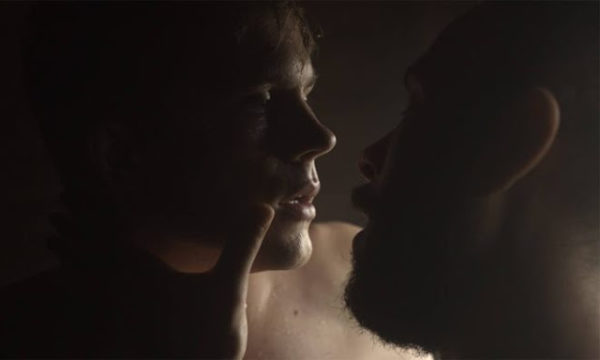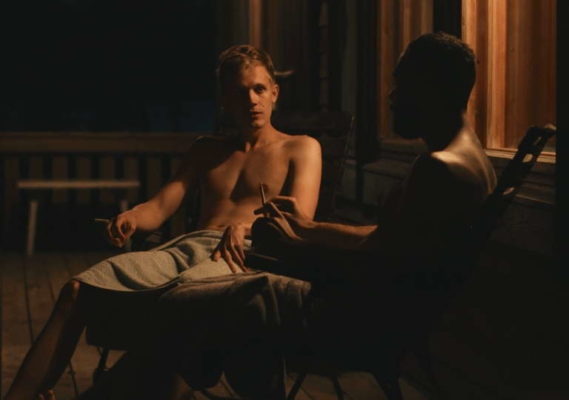
It appears that at least once a year, LGBTQ-hungry audiences are being gifted with a quiet, introspective gay love story that delivers both the romance, the passion and the geography porn. It truly is a marvelous time to be alive.
Following in the footsteps of Brokeback Mountain, Call Me By Your Name and – most closely – God’s Own Country, writer / director Mikko Makela’s debut feature film is the latest entry in a recent trend of gay art cinema films that chronicles a forbidden romantic relationship between two men from different backgrounds.
In this case, it’s Finnish graduate student Leevi (Janne Puustinen) – back home for a long weekend from his studies in Paris, France to help his father, Jouko (Mika Melender), fix up the family’s lakeside cottage for sale – and Syrian refugee, Tareq (Boodi Kabbani) who is brought on as a handy man. Almost immediately the men are forced together because Tareq does not speak Finnish and Jouko’s command of English doesn’t extend beyond polite chit-chat, meaning that Leevi must act as translator. He’s also required to be the mediator, explaining Tareq’s frustration to his father because the refugee is unable to procure better work despite his expertise as an Architect; Leevi is also negotiating his father’s volatile xenophobia, which adds an additional layer of complication to their already strained familial relationship.
The tension eases up when Jouko is called away overnight on business and the pair of younger men are left getting to know each other. Makela wisely takes his time developing their relationship: for the better part of their dockside chat, their discussion in the sauna, their romp in the lake and finally their nighttime drinking on the porch, the topics are shallow and general. In fact there’s barely any sense of a romantic connection; these are guarded men circling the wagons. Still, a few lingering glances from one when the other isn’t looking serves to build anticipation and by the time the pair finally lock eyes in a knowing fashion at night’s end, both the characters and the audience are ready to put an end to the slow burn and get down to action.
Makela expertly employs a handheld style, as well as tight framing and slightly disjointed editing to convey the impassioned intimacy of their first sexual encounter. Leevi and Tareq’s coupling has a hungry, desperate vibe; the scene teeters somewhere between graphic and carnal and Makela’s script allows it to play out longer than usual before cutting to the next morning. From this point on the connection between the men shifts and their interactions, both verbal and physical, are more charged, sexualized and meaningful. Conversation about the weather is replaced by startlingly frank revelations about Tareq’s double life in Syria and his flight to Finland, as well as Leevi’s memories of his deceased painter mother and his uncertainty about love following a prior relationship back in Paris.

A Moment In The Reeds spells out its central conflict in its title: this is a film that traffics in a fleeting fantasy. The reintroduction of Jouko and the realities of the external world quickly threaten to upend the romantic connection between the new lovers. In this way, comparisons to God’s Own Country are certainly apt and unavoidable, particularly the gorgeous, empty countryside playing host to forbidden desire and brooding spectacle.
The natural beauty is amplified by Makela’s exquisite direction and the naturalistic performances by the two leads. Puustinen and Kabbani wisely underplay their attraction until the men act on their desires, at which point their sexual chemistry and affection comes on strong. Although I’m not in favour of a requirement to hire LGBTQ actors to play queer characters, the ease with which the two men interact, particularly in the sex scenes, belies a comfort by the real life gay actors that is absent in other projects.
The film is not without criticism. Despite all of the groundwork laid in advance, the ending of the film feels sudden and abrupt, which won’t satisfy fans of the film’s otherwise languid pace. Narrative-focused audiences, meanwhile, may find that their attention drifts: this is a simple, straightforward story about a brief, fleeting encounter between two men. At one point Tarek mentions “a fantasy experience” and that’s what the film is for the majority of its runtime, for better or for worse.
Still, the political and social framework of the two men’s backstories is relatable and/or extremely topical. Leevi’s story is familial: he’s working through a communication rift between him and his estranged father and other unresolved issues in the wake of his mother’s passing. Tarek’s story is more global: he’s an immigrant recovering from the experience of being closeted in a country that’s hostile to the LGBTQ community at the same time as he struggles to establish a new life in a place where he doesn’t speak the language and can’t practice his own profession.
Both Leevi and Tareq are hungry – nay starving – for intimacy and someone who will listen to them (sexually, romantically, and emotionally). Considering how memorable and impassioned Mikko Makela’s film is, audiences may find themselves devouring A Moment In The Reeds with similar enthusiasm. It’s a strong contender for queer film of the year.
4/5